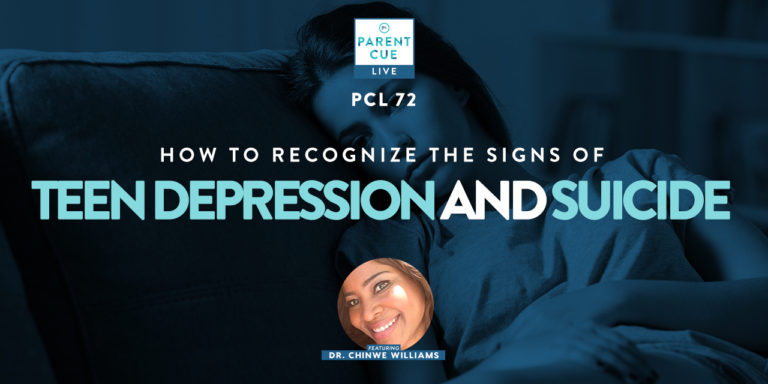
[soundcloud url=”https://api.soundcloud.com/tracks/438144000?secret_token=s-8jKyJ” params=”color=#ff5500&auto_play=false&hide_related=false&show_comments=true&show_user=true&show_reposts=false&show_teaser=true&visual=true” width=”100%” height=”300″ iframe=”true” /]
Dr. Chinwe Williams, a licensed professional counselor, joins host, Kristen Ivy, to talk about ways to recognize and address teen depression and suicide.
YOUR CUE
- Look for multiple symptoms over the course of two weeks. Be aware of your child’s behavior — is he or she withdrawing from social activities, letting their otherwise clean room fall into disarray, and not eating? And have these behaviors lasted longer than usual? These might be signs there’s a bigger issue going.
- Check in, but don’t make assumptions. Ask your child leading questions about how they’re feeling in a calm, non-judgemental way. Don’t try to define how they’re feeling for them — their explanation is what you need to hear in order to gauge where they are emotionally.
- Keep following up and be consistent. Continue to check in with your teen regularly and keep the lines of communication open in good times and in bad times. Your teen should know they can come to you at all times.
EPISODE RECAP
There used to be a time when parents of teenagers simply had to worry about underaged drinking and missed curfews. These days, parents of teens are faced with much bigger, more dire challenges — teen depression and suicide.
According to statistics, depression and suicide among teens are at an all-time high, with suicide being the third leading cause of death in young people. With the added pressure of meeting academic and social standards, teens are struggling to cope with life’s demands, often leading to self-destructive behaviors.
According to Dr. Chinwe Williams, a licensed professional counselor, there are often signs teens show that signal things are off in their worlds. These signs include a change in appetite and behavior, declining school performance, and withdrawing from activities they’d ordinarily participate in among others. It’s important, she says, for parents to study their kids and respond quickly when things seem amiss.
“We all know depression, if left untreated, can lead to thoughts of suicide.” Chinwe shares.
In today’s episode, Dr. Williams gives some important tips on how to talk to your teenager when you suspect they’re suffering from depression, why remaining calm is the most important reaction a parent can have, the surprising effect of teaching your kids to serve others has on their emotional health, and what preventative measures parents can take to hopefully decrease the likelihood of depression and suicide in their teen.
MENTIONED IN THIS EPISODE
QUOTES IN THIS EPISODE
“We all know depression, if left untreated, can lead to thoughts of suicide. —@drcuwilliams
Click To Tweet
If a parent learns a suicide has occurred in their child’s peer group, it is a time for them to…
Click To Tweet
It’s important for parents to be their child’s best advocate. —@drcuwilliams
Click To Tweet
VOICES IN THIS EPISODE

Dr. Chinwe Williams
Dr. Chinwe Williams, a licensed professional counselor.

CARLOS WHITTAKER
Carlos is an author, speaker, and content creator living in Nashville, TN with his wife Heather and 3 kids Sohaila, Seanna, and Losiah. He is addicted to social media, his wife’s enchiladas, and is determined to have his daughters teach him to land a backflip on the trampoline by the time he is 45.

KRISTEN IVY
Kristen is the Executive Director of Messaging at Orange, Director of The Phase Project, and co-author of Playing For Keeps and It’s Just a Phase – So Don’t Miss It. She combines her degree in secondary education with a Master of Divinity and lives with her husband, Matt, and their three children, Sawyer, Hensley, and Raleigh, in Cumming, GA.
Did you enjoy this episode? Help us spread the word!
Hopefully, this episode has helped you find a few practical ways to “do family better.” If you appreciated it, we would love for you to rate or review the podcast on Apple Podcasts. Your rating and review help get the podcast in front of new parents and listeners. You can also click the buttons below to share this episode on your own social media channels. Thank you for listening!
Source: The Parent Cue




